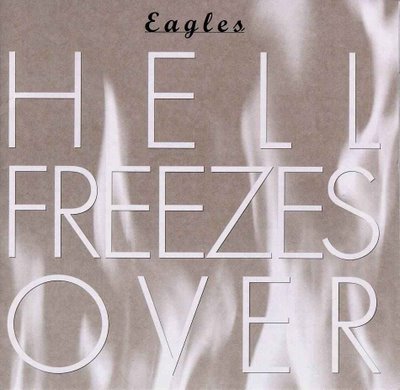
Hell Freezes Over (1994)

1. Get Over It
2. Love Will Keep Us Alive
3. The Girl From Yesterday
4. Learn to be Still
5. Tequilla Sunrise
6. Hotel California
7. Wasted Time
8. Pretty Maids All in a Row
9. I Can't Tell You Why
10.New York Minute
11.The Last Resort
12.Take it Easy
13.In the City
14.Life in the Fast Lane
15.Desperado
When their Greatest Hits was released in 1976, few could have predicted that just four years later the Eagles would vanish in a cloud of bitterness, lawsuits, and fatigue. Fewer still could have imagined that, some fourteen years after that, the band would not only reunite but return triumphantly — with a fresh tour, a new album, and more relevance than many acts half their age.
The reunion record was Hell Freezes Over — a cheeky nod to Don Henley’s famous quip that the band would get back together “when Hell freezes over.” And in true Eagles fashion, they didn’t just return — they arrived with polish, purpose, and a package so cleverly assembled that it barely registered how little new material it actually contained.
In truth, Hell Freezes Over is more an exercise in elegant symmetry than bold reinvention. The format is split — roughly 75% live performance, 25% new studio work — though the lines blur, as everything is executed with such clean, crystalline precision that even the “live” tracks often sound more like studio outtakes dressed up with applause.
The live material is impeccable. Rather than launching a full-scale arena assault, the band opted for a smaller, more intimate venue — a smart move. Gone are the stadium echoes and bombast of typical reunion fare. Instead, the setting allows for nuance, detail, and a spotlight on the musicianship that had always defined the Eagles. They glide through the hits — Hotel California, Take It Easy, Desperado — and also revisit deeper cuts with surprising tenderness. The Last Resort, Wasted Time, and Pretty Maids All in a Row are all handled with reverence, as though even the band is rediscovering their emotional weight in real time.
The one slight misstep in this otherwise curated set is the inclusion of New York Minute — a Don Henley solo piece that, while beautifully performed, feels like an outlier. With so many Eagles tracks to choose from, the insertion of a solo cut — no matter how strong — feels more indulgent than necessary.
As for the studio tracks, they’re few but effective. Get Over It kicks things off with snarling irony and a jagged riff — a Frey/Henley number that reads like a broadside against 1990s victim culture. The irony is delicious: Henley, a man whose solo output was defined by lyrical brooding, now instructs the world to stop whining. It’s performed with such relish that one suspects he’s fully in on the joke. Learn to Be Still, by contrast, is Henley at his introspective best — slow-burning, meditative, and as much a continuation of his solo style as it is a contribution to the Eagles' catalogue. If the line between Henley solo and Eagles proper ever blurred, this is where it happens most gracefully. The Girl from Yesterday, sung by Frey, nods back to the band’s country leanings — a gently mournful ballad that, while competent, never quite demands a second listen. It is easily the least essential of the quartet. The real gem is Love Will Keep Us Alive, a soft, mid-tempo ballad sung by Timothy B. Schmit — only the second Eagles song he’d ever fronted. It’s delicate, heartfelt, and delivered with such unforced warmth that it instantly earns its place in the Eagles canon. In many ways, it sounds more like “classic Eagles” than any other new track on the record.
The lineup, crucially, is the same that delivered The Long Run: Frey, Henley, Walsh, Felder, and Schmit. There’s no Meisner, no Leadon. The band had clearly decided to resume where they left off, rather than attempt a full historical reunion. Practicality won the day.
The tour that followed was predictably enormous — a global affair that sold out consistently and reminded audiences just how airtight the Eagles could be on stage. Technology had changed, but the music hadn’t. The band, now middle-aged and mellowed, played with the poise of seasoned professionals and the polish of men who understood exactly how to service a legacy.
In the end, Hell Freezes Over wasn’t just a reunion — it was a reassertion. The Eagles weren’t coming back to relive the past; they were returning to claim it. And if the money played a role (it certainly did), so too did the music — tight, melodic, deeply American. After fourteen years, they still had it. And more to the point, they knew it.
Go back to the main page
Go To Next Review